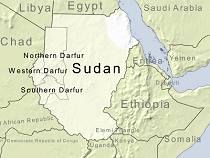-
(单词翻译:双击或拖选)
By Cathy Majtenyi
Nairobi
01 September 2006
The Sudanese government has expressed its strong opposition1 to Thursday's United Nations' Security Council resolution that calls for a U.N. peacekeeping force in the volatile2 Darfur region. Cathy Majtenyi reports for VOA from Nairobi.
-----
Sudanese Vice3 President Ali Osman Taha was among top government officials reported by the state news agency SUNA Friday as opposing the U.N. force. He was quoted as saying Sudan has "options and plans" to confront what he calls the international intervention4.
In reports Thursday and Friday, other members of the ruling National Congress party blasted the resolution, saying that Security Council members were split over what the Sudanese government terms a hasty vote.
On Thursday, the U.N. Security Council approved the deployment6 of 20,000 U.N. military and police personnel to take over from an African Union force in Darfur, which has seen an escalation7 of violence and chaos8 in recent months. But the troops would not deploy5 without Sudan's consent.
Welcoming the resolution are members of the Sudan Liberation Movement, one of several rebel groups operating in Darfur.
 The Darfur region of Sudan |
||
"We've seen U.N. forces everywhere, for example in Congo, or in Rwanda,” said Dhunya. “They don't seem to really take an active role in stopping whatever they were sent to stop. The U.N. forces are there, and still there is much killing10 going on, so I don't know what they are coming to do in Darfur."
An estimated 200,000 people have been killed and two million displaced by the three-year-old conflict involving government forces, rebel groups, and a militia11 called the Janjaweed that many say is backed by the Sudanese government.
The African Union force sent in to provide security has come under heavy criticism for being under funded, ill-equipped and having few powers.
Earlier this year, the Sudanese government signed a peace agreement with one of the rebel groups involved in the fighting.
The government argues that it has the capability12 to deal with the Darfur crisis, and that the presence of foreign troops is tantamount to an imperial invasion.
But aid groups, human rights officials and others argue that the U.N. needs to step in and avert13 the looming14 humanitarian15 crisis.
 收听单词发音
收听单词发音
1
opposition

|
|
| n.反对,敌对 | |
参考例句: |
|
|
|
2
volatile

|
|
| adj.反复无常的,挥发性的,稍纵即逝的,脾气火爆的;n.挥发性物质 | |
参考例句: |
|
|
|
3
vice

|
|
| n.坏事;恶习;[pl.]台钳,老虎钳;adj.副的 | |
参考例句: |
|
|
|
4
intervention

|
|
| n.介入,干涉,干预 | |
参考例句: |
|
|
|
5
deploy

|
|
| v.(军)散开成战斗队形,布置,展开 | |
参考例句: |
|
|
|
6
deployment

|
|
| n. 部署,展开 | |
参考例句: |
|
|
|
7
escalation

|
|
| n.扩大,增加 | |
参考例句: |
|
|
|
8
chaos

|
|
| n.混乱,无秩序 | |
参考例句: |
|
|
|
9
supervisor

|
|
| n.监督人,管理人,检查员,督学,主管,导师 | |
参考例句: |
|
|
|
10
killing

|
|
| n.巨额利润;突然赚大钱,发大财 | |
参考例句: |
|
|
|
11
militia

|
|
| n.民兵,民兵组织 | |
参考例句: |
|
|
|
12
capability

|
|
| n.能力;才能;(pl)可发展的能力或特性等 | |
参考例句: |
|
|
|
13
avert

|
|
| v.防止,避免;转移(目光、注意力等) | |
参考例句: |
|
|
|
14
looming

|
|
| n.上现蜃景(光通过低层大气发生异常折射形成的一种海市蜃楼)v.隐约出现,阴森地逼近( loom的现在分词 );隐约出现,阴森地逼近 | |
参考例句: |
|
|
|
15
humanitarian

|
|
| n.人道主义者,博爱者,基督凡人论者 | |
参考例句: |
|
|
|















